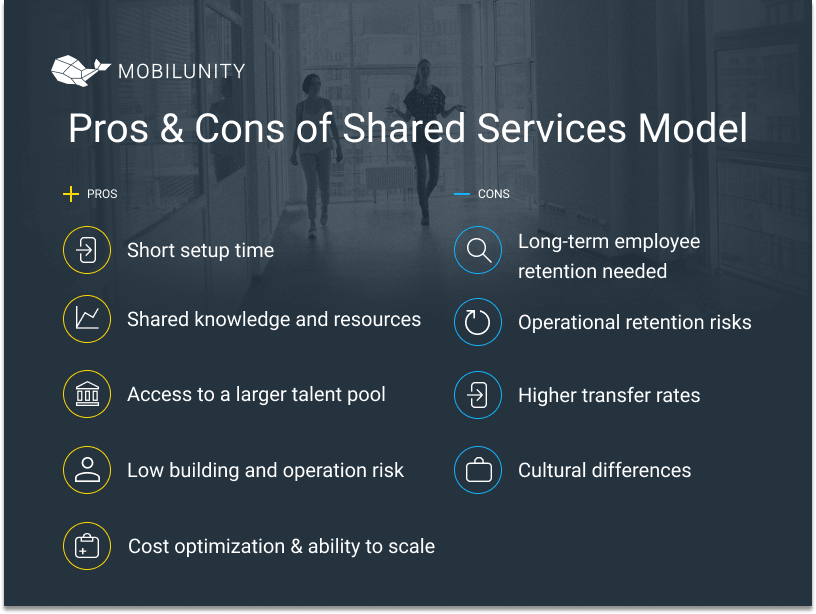Building Your Shared Services Center in Ukraine
- What Is a Shared Service Center
- Pros & Cons of Shared Services Model
- IT Shared Services Industry Specifics and Trends
- Why Choose Ukraine for Your Development Shared Service Centre
- How to Open a Turnkey Shared Services Center in Ukraine
- SSC Project Stages: How We Build a Shared Service Center On Demand
- Mobilunity as a Reliable Provider of SSC Service Solutions in Ukraine
The concept of a shared services center is not new, but in the last decade, it started growing in popularity tremendously. More and more international companies and global corporations are interested in establishing their own SSC (shared services centers) to reduce operational costs, maintain high service levels, and boost operational excellence.
In this article, we break down the specifics and trends of SSC service solutions, why these days Ukraine is one of the primary destinations for SSC establishment, and how a reliable partner can help you open a shared services center according to your business needs. If you are considering whether to hire offshore software developers or have your own SSC, this piece will come in handy.
What Is a Shared Service Center
Since the late 1980s, large-scale corporations and multinational organizations have been experiencing the growing demand for the very best service within the shortest time coming from their customers. The need to increase the operating efficiency without sacrificing the quality and stretching the budget resulted in the approach of clustering resources in one place.
At first, shared services centers (SSC) covered basic processes, such as back-office, to eliminate non-core functions and reduce operational costs. However, shortly, organizations understood that having a SSC as a core business entity would maximize the cost-effectiveness of the approach, enhance the service levels, and ensure the needed operational excellence.
Nowadays, SSC services play a crucial role in the performance and success of the organization as a whole. Shared services centers continue to develop, adopt new technologies, exchange knowledge, and generate growing operating profits. For the successful operation of a shared service center, companies, in turn, are continuously working on workforce and operational processes optimization.
How does a shared service center work? The SSC’s primary goal is to streamline internal operations, enhance and maintain the high quality of provided services and internal processes, and optimize costs. An SSC often takes care of the financial services, R&D, customer support solutions of the parent organization, among others.
Companies in many industries have turned to centralized structures with SSCs operating in different countries to achieve economies of scale and maximize the productivity of the organization as a whole. However, the structures and their complexity vary depending on each business vision and goals and can include the following parameters:
- End-to-end business services provision/provision on demand.
- Integrated and centralized system operations.
- Cross-functional integration.
- Efficient methodologies and key technology tools.
- Qualified talent recruitment and retention.
- Continuous performance and HR management improvement.
- Value-added services expansion and value generation.
- Established service and leadership culture.
- Key analytics and big data used for decision-making processes.
- Technology enablers as value determinants.
The necessity for team expansion arises when projects grow in complexity and scale, requiring more specialized skills and additional resources to meet deadlines and maintain high-quality output. Many organizations are in doubt when it comes to choosing between outsourcing vs shared services vs in-house, and it’s hard to find a clear, unbiased comparison of these approaches anywhere. Without further ado, here are these solutions in a nutshell:
- In-house: a company hires and manages a department on premises, taking care of all administrative and financial processes. This approach ensures great communication and teamwork, but often comes with a limited local talent pool and pretty high hiring and management costs.
- Outsourcing: a popular approach to delegating a number of tasks (software development, financial tasks, customer support) to an external services provider. You can monitor and control the performance of the team, yet it’s hard to find a reliable partner and a dedicated team to work on your business goals only. This solution is more suitable for short-term projects and not core processes, such as support and administrative solutions.
- Shared services center: an increasingly popular model that allows an organization to build and maintain your own organizational part located in another country with lower wages and operational costs that allows for cost-effective and productive solutions.
Pros & Cons of Shared Services Model
Let’s take a look at the advantages and disadvantages of the IT shared services model. Firstly, let’s discuss the IT shared services benefits:
- Short setup time. It’s possible to set up a shared service center within a couple of months. With the help of a reliable provider, you can get a custom SSC solution without hassle or compromises.
- Shared knowledge and resources. A shared services center allows for knowledge sharing, enhancement, and development, which multiplies the resources available to the company.
- Access to a larger talent pool. A local market opens access to the local talent pool, and if you choose the right country, you can hire top-level experts at much lower rates, compared to the country of origin.
- Low building and operation risk. By opening a SSC, the organization can save on operational costs, while maintaining the same risk-free environment and monitoring the performance of the center.
- Cost optimization. One of the main benefits is undoubtful cost optimization that allows to reduce operational costs, optimize logistics, boost R&D without spending a fortune, and much more.
- Economies of scale. Economies of scale in both staff and infrastructure leads to a better-balanced workload.
Of course, there are also some drawbacks that come with shared services IT. However, it’s worth noting that these cons are more of risks that can be mitigated when working with a reliable SSC provider:
- Long-term employee retention. For a shared services center to work in line with the main operational premises, a long onboarding process coupled with long-term employee retention are needed.
- Operational retention risks.There’s a risk of retaining irrelevant operations for long periods of time without much influx if proper quality control and monitoring tools are not implemented from the beginning.
- Higher transfer rates.Transfer rates would probably be higher compared to transferring employees within the country of origin.
- Cultural differences. There’s a chance cultural differences may be a blocker to fruitful operation. However, by choosing a SSC destination with cultural and geographical proximity, this problem can be easily avoided.
IT Shared Services Industry Specifics and Trends
According to the Deloitte 2019 Global Shared Services Survey Report, the shared IT services industry has the following positive impact on the businesses that adopted this approach and is believed to be even more in-demand:
- 54% of the respondents that have their own SSCs had $5B+ in revenue in 2019, with an increase of 20% from 2017.
- Among these businesses, 24% of respondents had $25B+ in revenue last year, with an increase of 8% points from 2017.
- 15% of organizations that practice the SSC approach are among Fortune 500 companies.
- The top sectors for SSC include Retail & Consumer Products, Healthcare & Life Sciences, Automotive & Transportation, and Hospitality & Services (47%+ of respondents).
- Finance, HR, and IT services are the most predominantly deployed in SSCs (that follows the historical trend).
- Establishment of strategic and interaction-heavy SSCs (such as procurement and customer service) shows steady growth in scope.
- Procurement (14% increase over 2017), Customer Service (33% increase over 2017), Sales & Marketing (35% increase over 2017), and Supply Chain/Manufacturing Support (33% increase over 2017) have seen the largest increases in SSCs.
- R&D has the highest percentage of FTEs deployed from COEs, among other functions.
- The majority of respondents report up to 15% annual productivity savings, thanks to their SSCs.
- 48% of organizations reinvest the saved costs in the SSCs, while 20% spend it on technology and 14% reinvesting in process improvement.
As can be seen from the statistics above, companies are on the constant lookout for boosting their operations performances, taking into account the need to improve profitability and shareholder value, and shared service centers play a crucial role in achieving these business goals. Therefore, it’s important to highlight the SSC trends that drive the global market today:
- Customer-centricity focus. Every company that wants to strive must put its customers first and align their value propositions per this approach. This increases the relevance of shared service centers that aim at providing top-level services to the users.
- Process standardization. Organizations that have SSCs in different countries especially need to be consistent and coherent in their values and how they provide their services.
- Technology as a driver. Shared service centers often facilitate the implementation of the new technologies to ensure the smoothest work and the most relevant solutions offered to the customers. Therefore, SSC management faces not only the need to evaluate and monitor the newest technologies on the market, but also to facilitate their integration in SSC processes and assess the resulting performance.
There are several factors that companies take into consideration when choosing the country to establish a shared service center, including:
- Labor force (availability, qualifications, language skills, wage costs, and labor productivity).
- Infrastructure and premises (availability of office space, rental costs, communication means, cultural and geographical proximity).
- Stability (political and economic stability, investment support, business climate, legal specifics).
In recent years, Central and Eastern Europe (CEE) has established itself as one of the most promising SSC destinations. With the continuous increase of operational costs in the countries of origins coupled with IT talent shortage in the US, Canada, and Western Europe, companies are looking for new promising markets.
Lately, international corporations are gaining a growing interest in Ukraine as the destination for their SSC solutions, as it incorporates all the crucial factors for global businesses and can boast of a highly educated and motivated labor force at a much more affordable cost compared to the European countries.
Why Choose Ukraine for Your Development Shared Service Centre
Nowadays, Ukraine is one of the most lucrative destinations for businesses and investors interested in opening a profitable and productive shared services center. According to the latest KPMG report, Ukraine is an attractive option for the SSC establishment thanks to the country’s convenient geolocation, well-developed transport infrastructure, highly-qualified labor force, a large talent pool, and low operational costs. No wonder that Ukraine is the top country for IT outsourcing, with 500+ software development outsourcing companies and 100 global R&D centers operating and there.
As highlighted in the report, the Ukrainian economy has shown steady growth since 2015, with the inflation numbers coming down to 6% in 2020 compared to 13.7% in 2017. GDP also shows steady growth, with an increase of 2.5% in 2017, 3.3% in 2018, and 3.0% in 2019.
Thanks to the strategic economic reforms conducted with the support of the International Monetary Fund and the World Bank, as well as the growing number of highly-educated specialists in different fields, Ukraine is believed to achieve even higher economic growth in the upcoming years. Besides, it’s ongoing integration with the European Union makes Ukraine a favorable investment location.
It’s worth noting that in the fDi’s Smart Locations of the Future 2019/20 ranking, two major Ukrainian cities, Kyiv and Lviv, were ranked 5th and 8th respectively as the most cost-effective cities in the world. Besides, here are some perks of Ukraine as a SSC destination:
- Ukraine is nearly at the crossroads of all the major trade routes, with 2 hours at maximum to fly to most European capitals. With 72 new routes added in 2018, Ukraine is in the top 20 fastest-growing aviation markets.
- Citizens of the EU, US, Canada, UAE, and many other countries could visit Ukraine without a visa for up to 90 days in every 180 days (in pre-pandemic times).
- Ukraine is ranked 50th of 157 countries in the World Bank’s Human Capital Index, the rating that determines the health and education condition within the country that influences the productivity of the next generation of workers.
According to the Deloitte report, there’s a tremendous number of R&D and BPO (Business Process Outsourcing) centers established and operating in Ukraine:
- 100+ R&D centers (40k+ IT experts, TOP-20 IT/R&D companies operate for organizations from Europe, UK, US, including corporations from Fortune 500).
- 60+ BPO centers (providing data entry, customer support, accounting, administrative, back-office services, etc.).
Referencing the KPMG and Deloitte reports mentioned above, as well as the official company websites, many international companies have a significant presence in Ukraine and have their own SSC successfully running for years, benefiting the companies’ goals and ensuring cost-effective and efficient services provision.
Among the companies that opened shared services solutions in Ukraine are KOSTAL, AB-InBev, Nestle, VEON, PwC, and Gruma. These companies trust various services to Ukrainian experts, from R&D to logistics and financial services.
| Company | Industry | Location | Country of origin | Services | Approx. Headcount |
| KOSTAL | Automotive | Pereyaslav-Khmelnytsky | Germany | Financial services, procurement, sales, R&D, etc. | n/a |
| AB-InBev | Food processing | Kharkiv | Belgium | Logistics, procurement, HR and financial services | 600 |
| NESTLE | Food processing | Lviv | Switzerland | Financial services | 1089 |
| VEON (Kyivstar) | Telecommunications | Lviv | The Netherlands | Personnel administration, financial services, procurement, etc. | 247 |
| PwC Service Delivery Center | Professional services | Lviv | United Kingdom | Audit, tax and advisory services | 350 |
| Gruma | Food processing | Cherkasy | Mexico | Financial services | n/a |
To summarize the strengths, weaknesses, opportunities, and threats of opening a SSC in Ukraine, we conducted a SWOT analysis of Ukraine as an IT shared services center location.
| Strengths | Weaknesses |
| 1. A large IT talent pool in Ukraine, besides other specialists 2. Highly qualified labor force (400,000+ graduates annually, 14+ million people with higher education) 3. Low wage costs and favorable tax rates for business (Corporate Income Tax at 18%, Value Added Tax at 20%, Personal Income Tax at 19.5%, including a temporary 1.5% military tax, Unified Social Security Contribution at 22% capped at the level of 15 minimum wages (approx. $2,230) 4. Transfer pricing policies similar to OECD countries 5. Flexible employment regulation 6. Affordable salary rates 7. High foreign language skills (Ukrainian students are bilingual (Ukrainian/Russian), the majority also has a good command of English, plus a secondary European language (German, French, Spanish) 8. It takes only 2 hours to fly to Ukraine from most European capitals (great international flight connection that grows tremendously each year) 9. Cultural similarities with European countries | 1. Kyiv, Lviv, and Kharkiv inhabit the vast majority of Ukrainian IT experts, limiting the options for large-scale SSCs; 2. There’s a lack of appropriate office space outside Kyiv (7x times less suitable space in other cities) |
| Opportunities | Threats |
1. Ukraine shows advancements in deregulation, investment policy frameworks, reforms, and tax policies, making it easier for local and foreign investors to do business in the country; 2. Improving business climate (according to The Doing Business Report, Ukraine advanced from 112th place in 2014 to 64th in 2020) 3. Potential SSC locations are not limited to the capital of Ukraine (Kyiv), but also include other major cities: Kharkiv, Lviv, Odesa, Dnipro, Ivano-Frankivsk 4. Quality office space is available for SSC establishments of any scale at an affordable cost 5. The Ukrainian Labour Code is flexible and allows investors and employers to reorganize SSC operations easily in response to the changes to the business environment | 1. Strong competition from neighboring countries, such as Poland, with a large IT community, yet higher labor costs; 2. A number of SSCs opening at a time can cause a temporary talent shortage; 3. Without a reliable partner, it can be cumbersome to open a SSC in Ukraine that complies with all the local regulations and operates exactly as planned. |
How to Open a Turnkey Shared Services Center in Ukraine
Mobilunity is a reliable SSC provider that assists companies that want to be independent of vendors by running and operating their very own shared service centre in Ukraine. If you are looking for a credible partner to delegate the SSC service solutions development turnkey project, you’ve come to the right place.
We offer a helpful and beneficial shortcut — as a vendor, we assist you in setting up your own SSC in Ukraine:
- Here you can get help with building a permanent team for your business.
- Top-level assistance with team management, assessment, and operational services.
- Hassle-free transfer of the mature team to your operational division on demand.
The advantages of partnering with Mobilunity include but not limited to the following:
- Minimal investment until you are confident in the shared services business model.
- You can test the IT shared services model out, before committing to managing everything yourself.
- Flexibility to stop or pivot at any time.
- No hassles with wages & taxes, real estate agencies, suppliers, etc.
- High speed of opening a development center.
Therefore, if you are interested in opening a shared services center in one of the most prominent SSC locations, you can get top-level assistance with opening a turnkey solution by choosing Ukraine and Mobilunity as your reliable partner here.
SSC Project Stages: How We Build a Shared Service Center On Demand
Here is a detailed table describing the stages of IT shared services center development and how we at Mobilunity work on each step. Every project differs, and we are eager to customize the process according to the business’ needs, but below you can find out about the general workflow in detail.
| Project Stages | How It Works |
| Defining the team’s size and structure | First of all, we discuss your business needs, goals, and vision to define the structure of the SSC needed, as well as the experts required for the successful operation of the center. |
| Planning & sourcing | The planning stage includes preliminary research, operation planning, and human resources sourcing. |
| Team foundation and extension | Next, we move to crafting a team of highly qualified experts as per your SSC requirements. Should you decide to extend or reorganize the team, we can proceed with the corresponding adjustments to meet your business needs. |
| Assessment stage | We present the developed solution and provide you with a detailed report on the SSC preparation for assessment and discussion. Once we make sure it’s the exact solution you need, we move on to the implementation stage. |
| Administrative stage | The administrative and implementation stage includes SSC location management, contract management, budget planning, accounting services for the SSC, hiring support personnel needed, etc. |
| Legal support for the SSC creation and management | Our experienced legal experts also help with legal entity foundation, real estate search, and lease agreements signature so that we can move to the final stage of the SSC development. In Ukraine, a Limited Liability Company (LLC) can be registered in 2-3 business days (including registration with fiscal, statistics, and social security authorities, and setting up a bank account). There is no minimum share capital requirementfor an LLC, and an LLC can be entirely owned by foreign investors. |
| You’ve got your own SSC | Congratulations! You get your own shared services center with the best local talents working on your business solutions in line with your company’s requirements and values. |
Mobilunity as a Reliable Provider of SSC Service Solutions in Ukraine
Mobilunity is a renowned Ukrainian company that has been providing top-level dedicated team development services and offshore resources to businesses on the global market for 10+ years.
We are proud to work with more than 40 companies in 20+ countries all over the globe so far, and we are open to new collaborations. Among our clients are:
- Camptocamp (Switzerland);
- Paidy (Japan);
- ICUC.Social (Canada);
- Network of Arts AG (Switzerland), and more.
Our experienced human resources experts know how to source and recruit the right candidates for shared service centers. When it comes to building a center for shared services according to the company’s requirements, we take care of every detail on each stage of the project, starting from planning to the onboarding processes.
If you are in search of a credible partner to establish an offshore development center in Bulgaria or Ukraine, here you can get the top-level solution. Get in touch with our representatives today, and get industry experts working on your SSC turnkey project to meet your business needs and exceed your expectations.

















